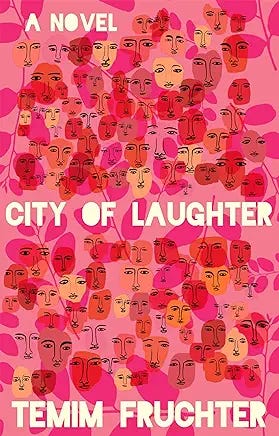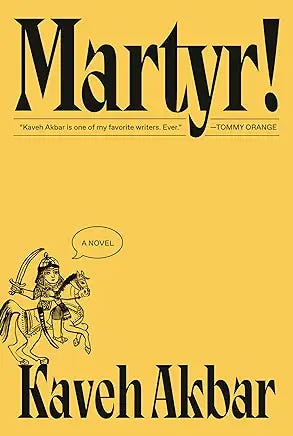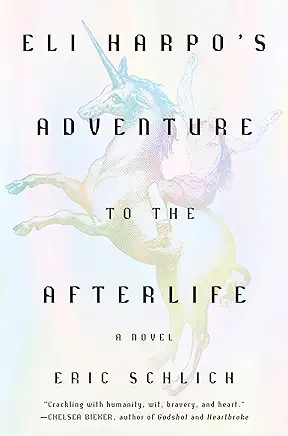Three of January's Best Books
New music from The Paranoid Style & Vera Sola, interviews with E.J. Koh & Maggie Millner, a new Rebecca Solnit essay, and more
2024 kicked off with three strong debut novels.
Temim Fruchter’s City of Laughter is a stunning debut, a moving multi-generational queer Jewish coming-of-age novel.
Kaveh Akbar has been one of my favorite writers since I started reading his poetry years ago. Akbar’s novel Martyr! is inventively told, marvelously complex, and easily one of the most unforgettable debuts I have ever read.
Eric Schlich’s novel Eli Harpo’s Adventure to the Afterlife is a breathtaking debut, a brilliant satire that explores themes of queerness and religion.
What did you read in January? What books are you looking forward to in February?
A Playlist of the Week’s Best New Music (12 albums, 131 songs, 8 hours and 29 minutes)
This week’s new music releases include a new albums by The Paranoid Style; Vera Sola; True Green; Kirin J Callinan; Lee Scratch Perry; Kim Krans; The Last Dinner Party; Britti; Meth Math; J Mascis; Ariel Kalma, Jeremiah Chiu & Marta Sofia Honer; and Vijay Iyer, Linda May Han Oh & Tyshawn Sorey.
Largehearted Book & Music Links:
A new essay by Rebecca Solnit on how big tech changed San Francisco
By producing such extremes of wealth, tech is returning us to a kind of feudalism, with a few powerful figures accountable to no one.How Lucy Sante Wrote a Revelatory Memoir
Writing was no more a free space for play and self-expression than gender is. She represents her life as a fraught, embattled adventure of self-fashioning, played out on the page as much as anywhere else. To write was to invite severe scrutiny, as she learned during the era when her fervently Catholic mother searched her “room on any pretext and read every bit of writing she found there,”…
Dark Nights Of The Soul: Chelsea Wolfe’s Baker’s Dozen
Chelsea Wolfe recommended her favorite dozen albums at The Quietus.Why So Many Authors Are Writing Multigenerational Stories
…fiction, of course, has its limits. As I write this, I’m thinking of the records of entire families, neighbourhoods, and communities being obliterated, whether by war or other crises, their family trees hacked apart. Novels and short stories cannot restore those bonds, but they might be the only way to process the unfathomable.
Ty Segall on his discography
“It used to be all about the feeling and the inherent nature of sound—moving people physically and in turn [moving] them spiritually or emotionally in this whole religious experience of volume, which is cool,” says Segall. “But it’s not sustainable. Now it’s more about dynamics and having fun. Maybe a notch less serious.”- ’s interview with E.J. Koh
Ghostwriters Emerge From the Shadows
“There’s great value in building this community because of the nature of what we do,” said Daniel Paisner, who hosts a podcast about ghostwriting called “As Told To” and has collaborated on 17 New York Times best-sellers. “We do it in a vacuum, sitting alone in our underwear in our offices. We don’t get out much. So I think it’s helpful to be able to compare notes.”Couplets Author Maggie Millner Can’t Help But Break the Rules
Plato had a theory that poets should probably be banished from society. We’re liars because poets have some kind of constitutional resistance to the laws that structure society.- on her new novel
I saw it as a novel about women, about their desires and frustrations when surrounded by the hyper-masculinized sensibility that characterizes some rural communities nowadays. I found that no matter how securely I bolted the door against them, the male characters crept in through any windows I left cracked open. Turns out, the women in this story need the men and the men need the women.
Last Week’s LHB Feature Posts:
Andrés N. Ordorica’s playlist for his novel How We Named the Stars
“Music is central to my writing practice. It helps me to understand a character, their ever-shifting mood, charts their growth over time. I use music to get to know them, what they might listen to while going on a run, when drowning out the noise of an overactive mind, when mourning a broken heart.”
Jon Langmead’s playlist for his book Ballyhoo!
“My way into the world of early 20th century pro wrestling was realizing that it had an awful lot in common with the indie rock world of the ’80s, ’90s, and 2000s…”
Kaveh Akbar’s playlist for his novel Martyr!
Tara Sidhoo Fraser’s playlist for her memoir When My Ghost Sings
“When I write, it is vital that I am listening to music that creates the same feeling that I wish to portray in my own art.”
Zachary Pace’s playlist for their essay collection I Sing to Use the Waiting
“A true playlist, to my mind, will forever contain fourteen to sixteen tracks—the average number that would fit on a sixty-minute blank cassette.”







adding city of laughter to my wishlist now! and martyr! everyone loves martyr!